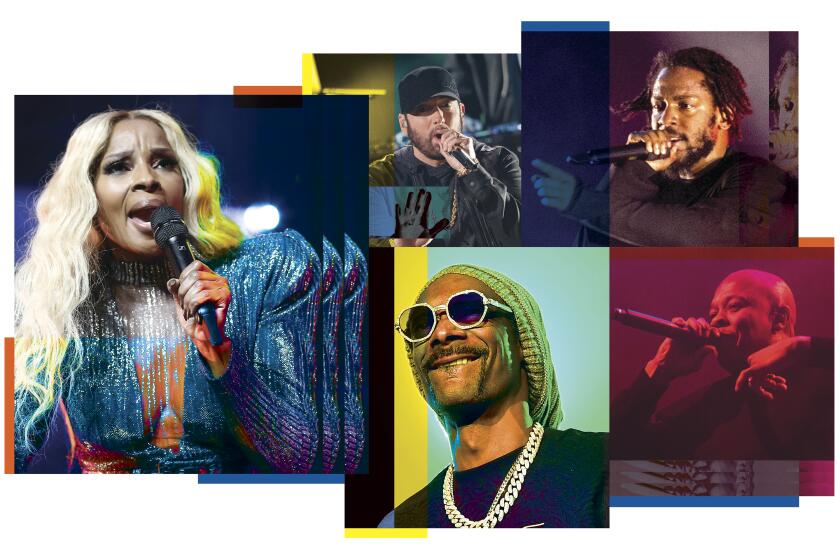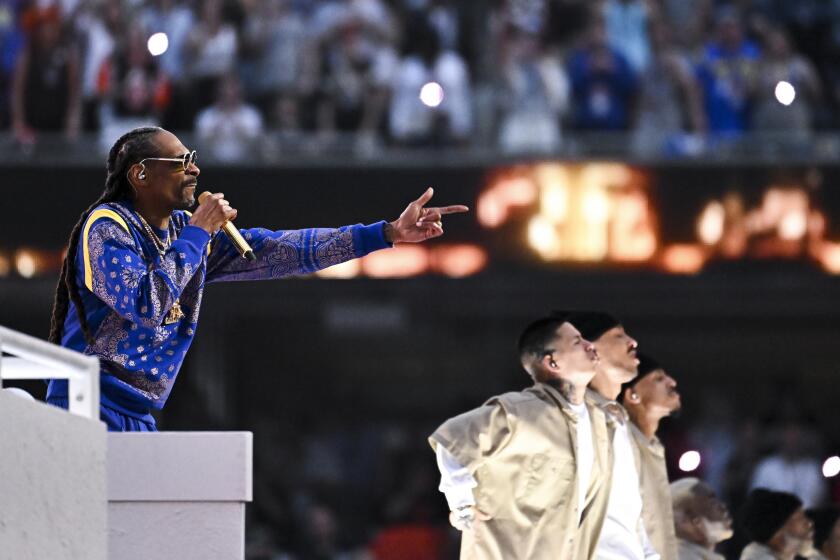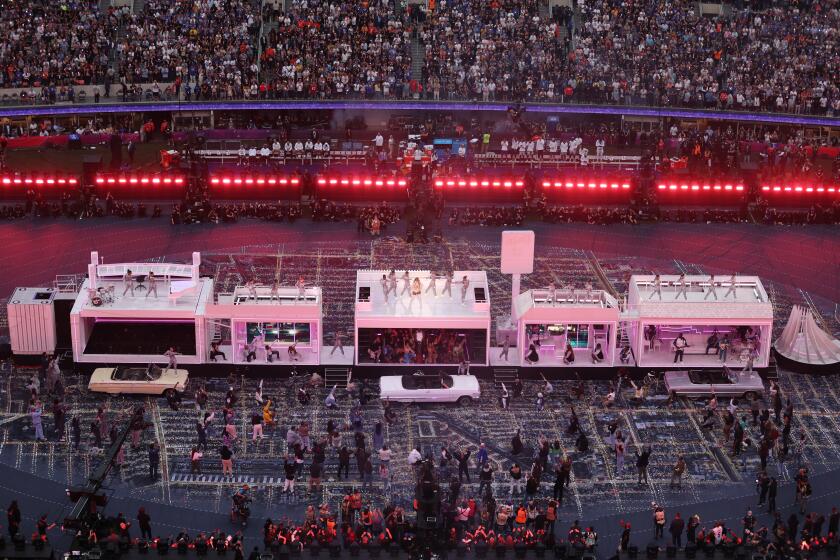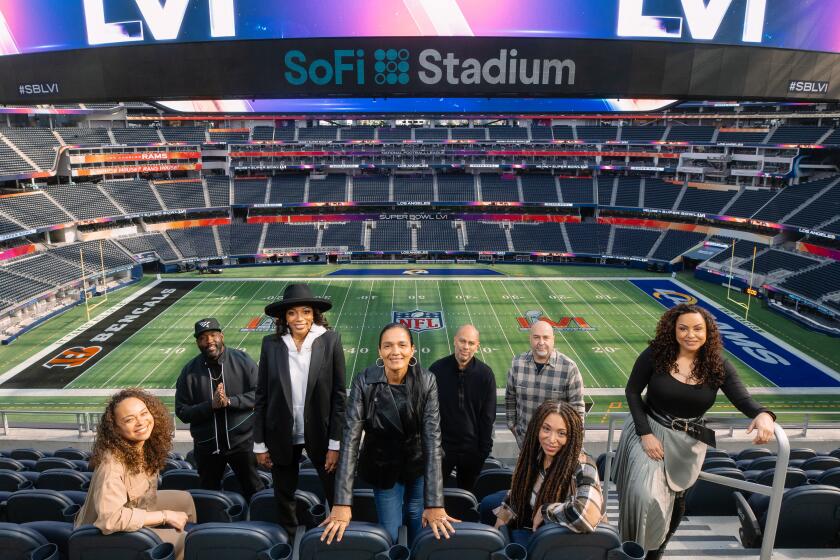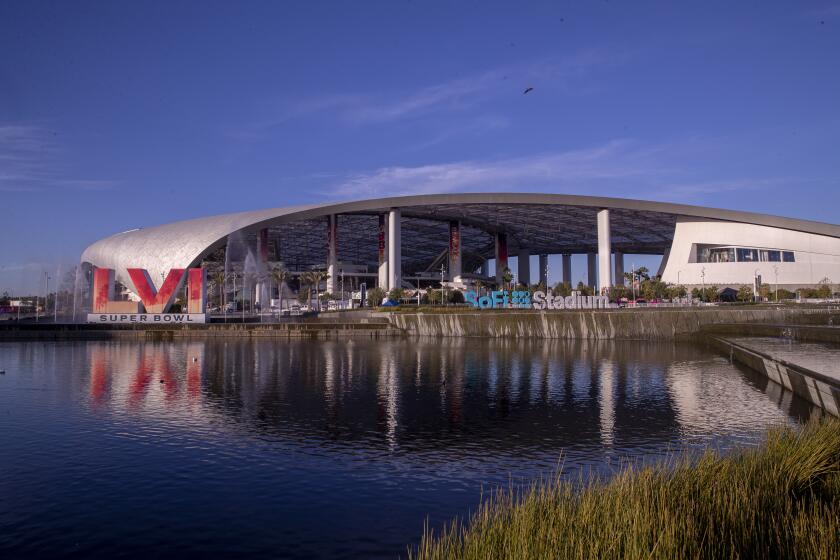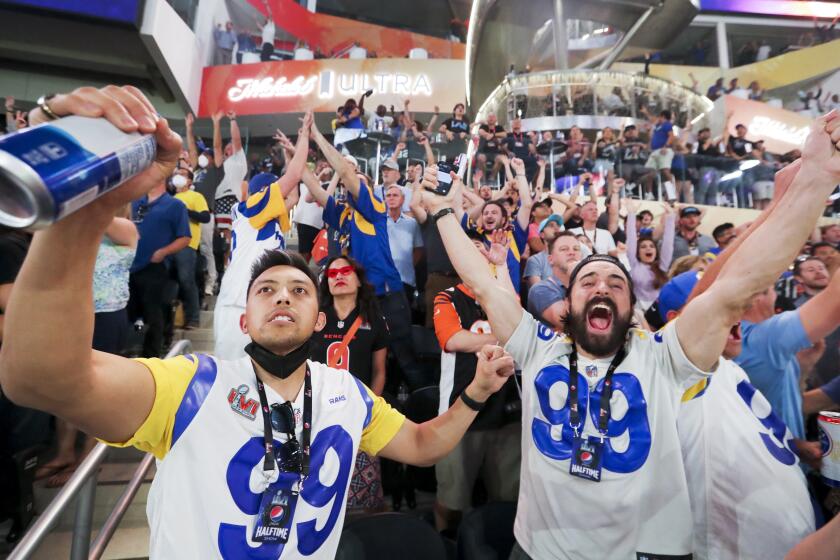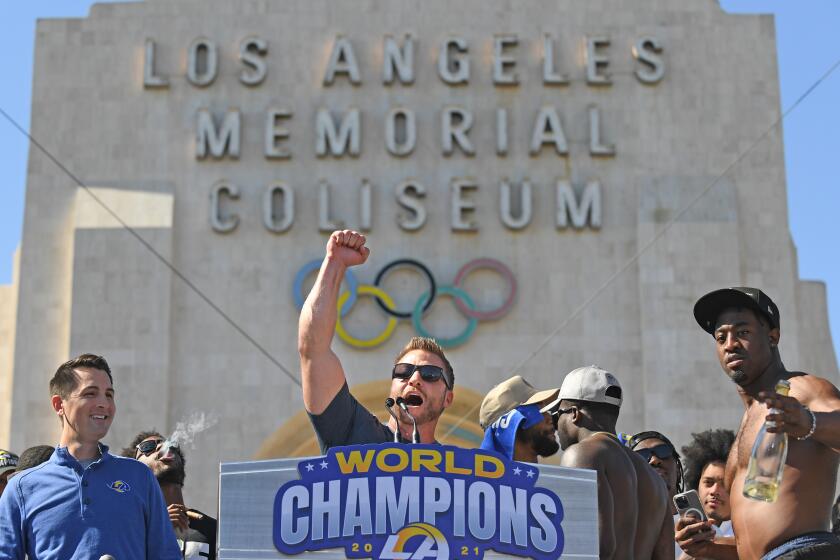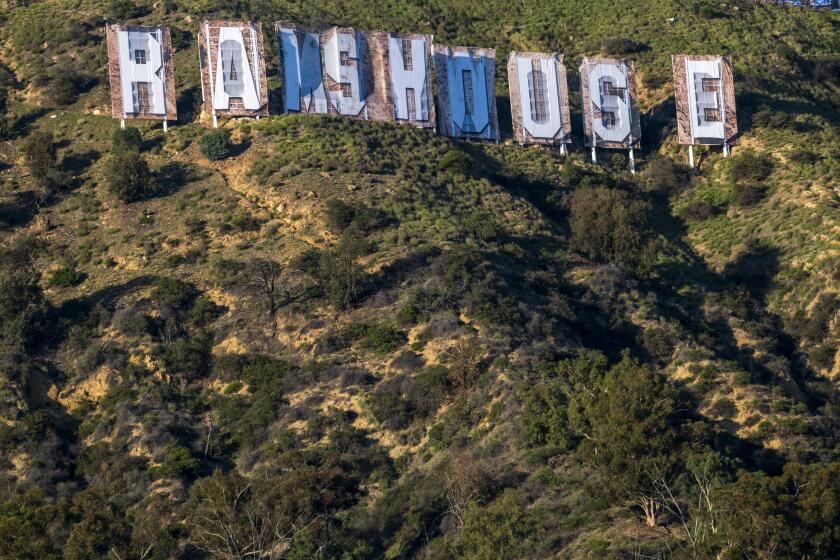Dr. Dre leads giant win for hip-hop in electrifying, ambitious Super Bowl halftime show

- Share via
Hip-hop finally came to the Super Bowl on Sunday when Dr. Dre led a team of his closest collaborators in a festive, funky, thoroughly trunk-rattling halftime show.
Decades into the genre’s domination of pop music — but not too soon for the famously conservative National Football League — Dre took over the field at Inglewood’s SoFi Stadium, close to where the Grammy-winning rapper and producer grew up in Compton, alongside Snoop Dogg, Mary J. Blige, Eminem and Kendrick Lamar for a nearly 14-minute spectacle that included some of the biggest rap hits of the last 30 years. 50 Cent, who hadn’t been announced in advance, also showed up to do his indelible “In Da Club,” which Dre co-produced.
For the record:
7:47 p.m. Feb. 13, 2022Dale’s Donuts was erroneously identified as Randy’s Donuts in an earlier version of this story.
The show, which came midway through the Los Angeles Rams’ hometown victory over the Cincinnati Bengals, was a proud celebration of Black L.A. from the get-go, playing out on a set done up with architectural replicas of Tam’s Burgers, Dale’s Donuts and the Compton courthouse. On Twitter, Questlove — the Roots drummer and director of the Oscar-nominated documentary “Summer of Soul” — called it “the most beautifulest blackest s— ever,” adding that the show was “the antidote for ALL the ‘Up With People’ness endured in the last 5 decades.” Public Enemy’s Chuck D tweeted that the performance was the best halftime show since Prince in 2007.
It’s hard to choose just 15 bangers from Dr. Dre, Snoop Dogg, Kendrick Lamar, Eminem and Mary J. Blige, but this Super Bowl playlist is a good start.
Dre and Snoop opened the production with “The Next Episode,” Dre dressed in all black and Snoop in Rams blue, then segued into “California Love,” 2Pac’s mid-’90s Dre-produced smash that shouts out Watts, Compton and Inglewood. On the field, dancers twirled between lowriders shimmering in sparkling colors.
For “In Da Club,” 50 Cent started out hanging upside down before descending into a mock nightclub populated by gyrating women.
Blige was up next, singing the low-slung “Family Affair” — another Dre-helmed hit — and “No More Drama,” which she finished in a flourish of growly R&B vocals that had to have been among the rawest, most impassioned in Super Bowl history.
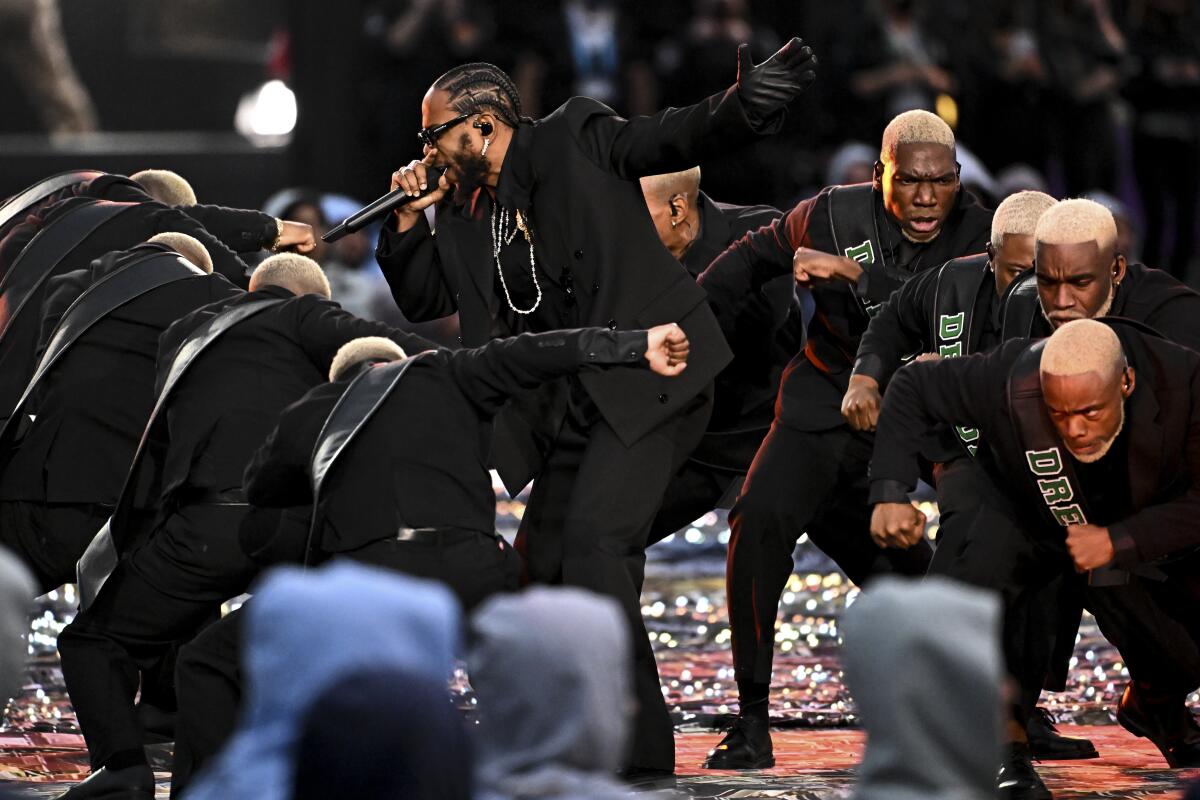
At Sunday’s game, Dr. Dre, Snoop Dogg and Kendrick Lamar led the first-ever halftime performance with rap at its center.
Lamar, widely regarded as the chief inheritor of the West Coast hip-hop tradition that Dre pioneered, appended a bit of his “good kid” to “Alright,” his unofficial Black Lives Matter anthem, which he performed amid a phalanx of dancers in quasi-military formation. The performance was sober and electrifying, though Lamar tweaked a line about how “po-po wanna kill us dead in the street for sure” to remove the explicit reference to police — a possible concession to the NFL, widely known to have kept a close eye on halftime performers.
For Eminem’s portion of the quick-moving show, he rapped a few lines from “Forgot About Dre” before moving into “Lose Yourself,” his Oscar-winning rely-on-yourself jam, for which he was backed by a live band that included Anderson .Paak on drums. Eminem finished his set by taking a knee, nodding to Colin Kaepernick’s much-discussed NFL protest from a few years ago.
To end the Super Bowl LVI show, the six hip-hop heavyweights convened at SoFi’s 50-yard line for a swaggering run through “Still D.R.E”; in contrast with Lamar earlier, Dre — who with his group N.W.A released “F— Tha Police” in the late ’80s — here preserved the song’s line in which he says he’s “still not loving police.”
Tam’s Burgers, Dale’s Donuts, Eve’s After Dark. Compton gets a bright spotlight as Dr. Dre, Snoop Dogg and Kendrick Lamar perform.
In SoFi’s parking lot before the game, 29-year-old Jason Gleeten, a lifelong Inglewood resident, said, “This is such a moment for Inglewood,” adding that, gentrification be damned, he wouldn’t sell his house for a million dollars.
Did this extended medley of Dre’s many era-defining hits give short shrift to too many classics? Of course. (That we didn’t hear Dre’s “Nuthin’ But a ‘G’ Thang” or Snoop’s “Gin and Juice” is a fact that will take days to process.) But after years in which the NFL seemed to pretend that hip-hop wasn’t America’s music, it was an undeniable thrill to see these performers getting their due so close to home.
Sade Elhawary, who said after the show that she was born and raised in L.A., said she especially appreciated Blige’s participation. “She’s someone you wouldn’t have necessarily expected to see at the Super Bowl, especially because it was all men,” she said. “As a woman, it was like, ‘Girl, hell yeah!’ Not just for women but this music represents our childhood in so many ways.”
This year’s show was the third halftime — after the duo of Shakira and Jennifer Lopez in 2020 and the Weeknd last year — overseen by Jay-Z’s Roc Nation company. The partnership raised eyebrows when it was announced and drew fresh scrutiny this month in the wake of an explosive lawsuit filed by former Miami Dolphins head coach Brian Flores, who alleges that he and other Black coaches were subject to the NFL’s discriminatory hiring practices. (Approximately 70% of NFL players are black, while the league had only two Black head coaches this season.)
In three years, Roc Nation diversified and modernized the Super Bowl halftime show. But as the recent Brian Flores lawsuit shows, changing the NFL isn’t easy.
Before kickoff, the Black country singer Mickey Guyton, who has spoken openly about the prejudice she’s faced in Nashville, sang a gospel-inspired rendition of the national anthem, while Jhene Aiko did “America the Beautiful” with a cool, jazzy lilt.
Times staff writers August Brown and Kenan Draughorne contributed to this report.
More to Read
The biggest entertainment stories
Get our big stories about Hollywood, film, television, music, arts, culture and more right in your inbox as soon as they publish.
You may occasionally receive promotional content from the Los Angeles Times.
